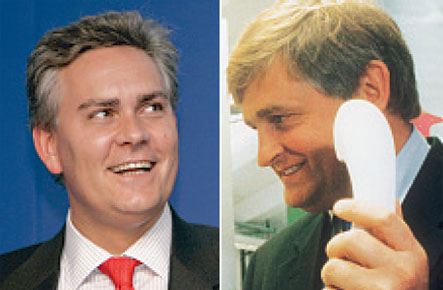Battle for INM wages on |
 |
| Kevin Rafter on why it is so important for Irish media to resolve the feuding at INM |
So who will it be, Denis O'Brien or Tony O'Reilly? At this juncture in the battle for control of Independent News and Media (INM), it is hard to know which party will emerge victorious. But an ultimate winner there will be. One of the business titans will walk away a loser, the outcome is important beyond the personalities and the money. This is not just a run of the mill business takeover story. Media companies matter more than their widget-making counterparts. They matter because the media is central to public discourse, the ownership of newspapers and broadcast stations impacts on the quality of democratic life. This assertion applies as much to the Sunday Independent and the Irish Daily Star as it does to The Irish Times, a variety of viewpoints, no matter what one thinks of the opinions expressed, serves to strengthen public debate.
In this regard, the future ownership of INM is a national issue. We should care about who eventually controls INM. Indeed, much more attention would have been paid to the INM story if the national agenda was not so dominated by the crisis in the public finances and the debate over NAMA. One consequence of this focus has been a lack of debate about the possibility of INM falling into foreign ownership.
Several international media groups are reportedly circling as O'Brien and O'Reilly jostle against a backdrop of impatient bondholders seeking repayment on hundreds of millions of outstanding debts. For all their faults, and the criticisms that can be made against them, O'Reilly and O'Brien are the devils we know. There must be real concern about the prospect of INM becoming a version of Eircom, tossed around on the international capital markets at the whim of its latest owners and their global strategic positioning.
O'Brien has invested too much money in recent years to settle quietly. O'Reilly's attachment is also financial although there is also a legacy to consider. Over the last 35 years he has built the group beyond the core publications of the Irish Independent and its Sunday bedfellow. Interestingly, as the two sides have slugged it out, once more in public in recent weeks, neither has given any indication about the future, as they see it, of the media in Ireland, and where INM fits into this dramatically changing landscape.
INM is one of the few Irish companies to succeed beyond its core base. During Tony O'Reilly's stewardship, the company successfully expanded into countries such as Australia, South Africa and India. The investment in the London Independent has been more contentious. The UK newspaper has not returned a profit but greater consideration needs to be given to the benefit the ‘Indy' provided for O'Reilly as he sought out other deals. Part of the operating losses at the Indy were, in truth, investment costs in expansion into other parts of the world – jurisdictions where an Irish newspaper owner would have struggled to get possible sellers to even answer the phone but where a space in the appointments diary was made for meetings with a UK media proprietor.
The value of the Indy, however, only travels so far. A luxury in good times, in this recessionary era the continued investment is questionable. O'Brien seems intent on forcing an exit from the UK newspaper market. He knows from his investment in Newstalk that media companies require deep pockets and cash is in short supply at INM as bondholders queue up for repayment of debts incurred in the years of expansion.
O'Brien's public declarations have so far only targeted the London Independent. But what of the Sunday Tribune, a much smaller entity but equally a serial loss-maker? In the early part of 2008, I attended a meeting in London at which senior management at the Sunday Tribune made the case to Gavin O'Reilly for strategic investment in the paper.
For over three years we have overseen a cost reduction programme at the Tribune which had brought the newspaper as close to break-even as it had ever achieved in its long and turbulent financial history. O'Reilly was been asked to provide the newspaper with the means to compete. He was flattering about the newspaper's editorial achievements against better-resourced competitors benefiting from marketing and ad campaigns.
In truth, no other newspaper has had the news successes of the Sunday Tribune on a meagre and permanently declining editorial budget. But the sharp economic downturn has hit the Tribune hard, and while there are probably more cost savings they are not on the editorial side. As INM is a publicly-quoted company there is not the opportunity to quiz the respective sides in the ownership-battle about their future ambitions for the group and, in particular, for its various interests in Ireland such as the Sunday Tribune.
But given the key role many of those publications play in local and national life it would be good if some forum was available to hear about the respective plans of O'Reilly and O'Brien beyond the bottom-line and the balance sheet.
 |
AT LOGGERHEADSTensions between INM shareholders Gavin O’Reilly and Denis O’Brien have risen in recent weeks amid growing disagreements over the group’s future. |
Kevin Rafter is a lecturer and journalist









